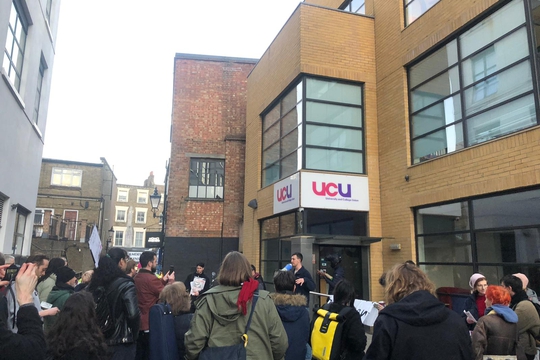Discovering a pregnancy while casualised

inquiry
Discovering a pregnancy while casualised
by
Anonymous HE worker
/
March 6, 2023
An anonymous account from higher education
We received the following anonymous submission to a call published in The University Worker about what is happening during the current UCU dispute.
I am a 37-year-old woman working in academia. I am one of those interdisciplinary generalists, who can fit in at least 3 different types of departments but is not specialised enough to be a particularly appealing candidate that will make the department shine through the UK REF. While universities promote interdisciplinary work, they have no clear structures to support the career path of someone like me.
Nevertheless, my work is recognized by those in my network, so I am constantly asked to collaborate with these (usually senior) people who can win big grants.1 This means that I am now on my third fixed-term contract, 5 years post a USA-based 7-year PhD, with more than 250 job applications and several finalist interviews behind me.
The nature of academic work also meant that for 3 years of my post-doc life, my partner and I had to live on different continents. It’s only because he decided to leave his academic career for something else that we now can live somewhat close (at least now we are in the same country and share a roof most weekends). His choice to leave his (tenured) position also means that we could finally start planning our future together and make plans to grow our family. I wanted to wait for job security, but I am not getting any younger, and as they say, there is no “right” time to grow your family should you want to.
Well, last week I found out I am pregnant. This is a source of great joy: we didn’t know if we could get pregnant, we had waited a long time, and I could hear my biological clock tick. I had done some tests that indicated that my hormones weren’t in the best state (thank you overwork!). But when I saw the line appear on the test I was overjoyed: It can happen! Even if this pregnancy won’t work out, we know we can indeed grow our family. I spent the morning in bliss.
But it didn’t last long. I downloaded that cute app that tells you what fruit size the embryo and then foetus is at various stages of the pregnancy, and that app allowed me to calculate the due date. Fuck. End of October. That’s a month after my contract ends. What now?
A few months ago, I had talked to a collaborator about joining his project at the end of the one that is funding me now. He informally offered me that job because I had been subject to discrimination in my current department (not everyone likes my interdisciplinary profile), which led me to feel very isolated from my current academic home. But how can I take a job with someone who trusts me, who is precarious also, and whom I would leave hanging dry two months after taking a one-year part-time job? Would I be even allowed paid maternity leave?
As the questions piled up in my brain, I decided to do some research. First, I checked the maternity leave policy of the institution I have been working for over the past 4 years. Here, I would be entitled to at least 3 months of full-pay maternity leave since I have enough length of service – but I would only get statutory maternity leave pay (considerably less) because I won’t be employed anymore by the time I go on leave. So, I went to check the maternity leave policy at the other institution: great, this other university says that there is no minimum amount of service to get occupational maternity pay, and there the full-time pay is for up to 5 months. That sounds ideal.
But I am an active union member, so I know not to trust university policy, and to do a little more research. This “research” required me to be more vulnerable and disclose my state with my line manager and one colleague/friend at this other institution. I must note that I am lucky I can trust my line manager, who, despite being far from perfect, I know won’t screw me over if I tell him.
Both my line manager and my friend told me that for people like me, on a 100% externally funded research contract, getting maternity leave can be tricky. Turns out that universities – or at least these two fancy Russell Group universities – (claim to) have no funds to cover the maternity leave of researchers. They say that maternity leave needs to be paid out of the grant (and I know grant proposals don’t include this type of money, the same way they don’t include funds to cover for the exorbitant UK visa fees for international workers).
This puts PIs between a rock and a hard place, as they have to give up on potential research output because paying for maternity leave out of the grant money means they cannot hire anyone else to do the job. What’s the problem, you say? PIs are usually senior people in secure positions. Surely, they won’t care if that engagement activity, that paper, or that data collection is delayed by half a year.
Well, turns out not all PIs are in this position. As I talked to my potential new line manager at the other university (another person whom I trust with sensitive information), it became clear that the position that we thought would fit me perfectly, might end up harming him as he is also on a (considerably fancier but still) fixed-term contract. Me taking this position and then leaving for 5 months would mean that the engagement activity that he’d hire me to do would not happen at all, as the grant would end only a few months after I would come back from maternity leave (it’s a one year position), and he would not be able to hire anyone else to cover my work while I’m away.
So, what am I left with now? A bunch of question marks that increase my already underlying anxiety about the pregnancy: will everything be ok? Will I have a miscarriage? Will the foetus look healthy? Will the network I painstakingly built over the last 4 years move on without me? Would having to terminate my pregnancy be good for my job prospects? Asking myself this last question makes me feel ashamed of myself. Perhaps, this will be the life event that will finally make me quit this sector.
In the meantime, I voted “yes” in the latest UCU ballot, in the hope that the union will make academia a better workplace for women and vulnerable people in general.
-
There are very few grants available for postdocs that work across humanities and social sciences. A lot of grant funding is available only to those who already have a permanent academic position in the UK. ↩
author
Anonymous HE worker
Subscribe to Notes from Below
Subscribe now to Notes from Below, and get our print issues sent to your front door three times a year. For every subscriber, we’re also able to print a load of free copies to hand out in workplaces, neighbourhoods, prisons and picket lines. Can you subscribe now and support us in spreading Marxist ideas in the workplace?
Read next

We Must Win Back Our Industrial Strategy
by
The University Worker
/
March 6, 2023

